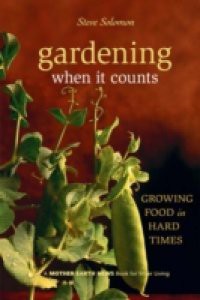The decline of cheap oil is inspiring increasing numbers of North Americans to achieve some measure of backyard food self-sufficiency. In hard times, the family can be greatly helped by growing a highly productive food garden, requiring little cash outlay or watering. Currently popular intensive vegetable gardening methods are largely inappropriate to this new circumstance. Crowded raised beds require high inputs of water, fertility and organic matter, and demand large amounts of human time and effort. But, except for labor, these inputs depend on the price of oil. Prior to the 1970s, North American home food growing used more land with less labor, with wider plant spacing, with less or no irrigation, and all done with sharp hand tools. But these sustainable systems have been largely forgotten. Gardening When It Counts helps readers rediscover traditional low-input gardening methods to produce healthy food. Designed for readers with no experience and applicable to most areas in the English-speaking world except the tropics and hot deserts, this book shows that any family with access to 3-5,000 sq. ft. of garden land can halve their food costs using a growing system requiring just the odd bucketful of household waste water, perhaps two hundred dollars worth of hand tools, and about the same amount spent on supplies working an average of two hours a day during the growing season.

